
Hey Kids, we had the great pleasure of the crew of Easy Virtue stopping by. Stars Colin Firth, Jessica Biel, Ben Barnes, director Stephan Elliott, writer Sheridan Jobbins and composer Marius De Vries shared their thoughts on this modern take on the classic Noël Coward play, singing onscreen and the intricacies of assassinating small Mexican dogs.
Dig it!
Easy Virtue
Colin Firth, director Stephan Elliott, writer Sheridan Jobbins and composer Marius De Vries
 The
Lady Miz Diva: I understand that Stephan Elliott originally meant to
have you sing in the film, but had a hard time getting you to agree.
The
Lady Miz Diva: I understand that Stephan Elliott originally meant to
have you sing in the film, but had a hard time getting you to agree.
Colin Firth: I don’t remember it this way. I normally have it that I’m always insisting on singing and everyone else is insisting I don’t sing. “Please Colin, don’t. Haven’t you harmed us enough?”
LMD: According to Stephan, you said you wouldn’t sing because at the time there were old ladies chasing you around the supermarket singing “Mamma Mia” at you.
CF: He’s just a compulsive fabricator. That is all evidence of his fevered imagination. Listen, he makes things up and I forget everything, so between us you can never get to the truth.
LMD: Would you have wanted to sing?
CF: I think so. I mean, now that I’ve listened to the soundtrack I feel rather bitter about not being on it.
{Stephan Elliott walks in making bunny ears behind Colin Firth’s head.}
He tried to get me in a skirt twelve years ago.
Stephan Elliott: Colin, tell them how I offered you Priscilla, Queen of the Desert.
CF: I almost did it. It’s one of my only actual regrets.
SE: There’s still time.
LMD: He’s just called you a big fabricator.
SE: He’s right!
Sheridan Jobbins: He tells stories for a living, what do you want?
LMD: I asked about the music, which is such a big part of the film…
SE: Well, here’s the composer right here in front of you {motioning to Marius De Vries}.
 LMD:
Did you have trouble getting your cast onboard with the singing in the
film?
LMD:
Did you have trouble getting your cast onboard with the singing in the
film?
SE: Musically, I went forward going, ‘Okay I’m going to try something I’ve never done before.’ There’s no underscore in this film, there’s no score. There’s no music for the happy parts and sad ones. I said we’re not doing it. Do you remember Cabaret, the Kit Kat Club? They played all those instruments and they played the entire score for Cabaret. So that got in my head; I said, “What an interesting idea.” Marius actually assembled … You go {to Marius De Vries}.
Marius De Vries: We put together a band of young musicians who knew jazz. We wanted to hand-pick a bunch of people who stayed with us throughout the whole process to develop a language and develop a style within the band and use that as the texture from which we’d underwrite the music.
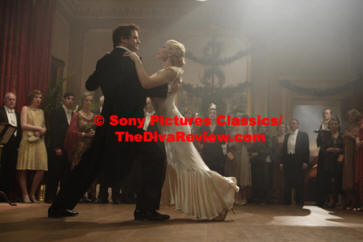 SE:
Once we had that base, it started to grow. Ben {Barnes} opened
his mouth one day and I just heard this voice and I went, “Whoa, whoa,
whoa, where did that come from?” And he said, “Actually, I was a singer
before I was an actor,” so I said, “Great.” Dragged him in, put a mike
in front of him, and literally, Jessica {Biel} is sitting on set
one day - she’s just singing to herself in this moment - you walk past
and you go, “What’s that?”
SE:
Once we had that base, it started to grow. Ben {Barnes} opened
his mouth one day and I just heard this voice and I went, “Whoa, whoa,
whoa, where did that come from?” And he said, “Actually, I was a singer
before I was an actor,” so I said, “Great.” Dragged him in, put a mike
in front of him, and literally, Jessica {Biel} is sitting on set
one day - she’s just singing to herself in this moment - you walk past
and you go, “What’s that?”
MDV: And then they didn’t want to be outdone by each other. They wanted to sing as much as possible.
SE: And Colin’s there saying, “I will never sing again after Mamma Mia. I will never sing again.” We twisted it around very slowly. He was in an ADR session when we put a mike up in front of him and he said, “What are you doing? I’m not singing.” It was quite clever; we talked him into it without him even knowing it.
LMD: Did you have any hesitation about inserting the modern songs into the classic Noël Coward play?
MDV: We had some pretty full discussions about that. We felt that initially we’d started with solely period material and we figured that would be the way to set the tone of it. But it became obvious just within the characterisations of the piece; there was a lot of tension between the modernity that Jessica’s character represents and the world that she comes into. We felt the music could help by having a little bit of that tension within it, as well.
SE: Let’s face it, it’s about culture clash and two ages, and old age and new age colliding. So then that musical jump, we didn’t plan it, it just started to happen. And then literally, when Car Wash kicked in, there was a moment when I was in the middle of it going, “What the hell are we doing?” But it works, it does! I’m not going to lie to you, there’s one or two people when you’re watching the screening, you lose ‘em. They’re furious at that point. Furious! One or two fellows said to me, “You’ve ruined the movie at that point,” cos they’re not going with the jump. But then, you watch it with a bunch of 18-year-olds and they light up like Christmas trees. And we’re tying to make this for a younger audience. If we shot this straight Coward, straight down the line, nobody would’ve gone to see it. And that’s just a sad state of the times we’re in; it’s a very difficult play…
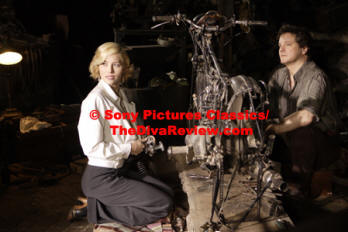 SJ:
It’s not irrelevant, either. The Car Wash line, about striking it rich
being “better than digging a ditch,” their lives have ended. The
machine age is here, everybody is leaving the country for the city, the
work’s better. It’s a really easy way to sort of say these people are
Car Wash people; this is the end of their life and they’re going to have
to find a new way of being. And one of the things in the play is that
Noël Coward was young; he was twenty-four when we wrote it. He was
writing it for twenty-four-year olds. He was writing something that was
both scandalous and amusing. The original mother-in-law joke - the
first time you see that as a theatrical piece. And meanwhile, he and
Cole Porter are writing about cocaine and flying in planes and latent
homosexuality, and all of these things, and it’s completely appropriate
to put in music that evokes that with a contemporary audience. That’s
what they’re singing about – Sex Bomb. If you think it’s old-fashioned,
it wasn’t old fashioned in 1924. And if you get a bit of rise out of
it, whether it’s irritation or pleasure…
SJ:
It’s not irrelevant, either. The Car Wash line, about striking it rich
being “better than digging a ditch,” their lives have ended. The
machine age is here, everybody is leaving the country for the city, the
work’s better. It’s a really easy way to sort of say these people are
Car Wash people; this is the end of their life and they’re going to have
to find a new way of being. And one of the things in the play is that
Noël Coward was young; he was twenty-four when we wrote it. He was
writing it for twenty-four-year olds. He was writing something that was
both scandalous and amusing. The original mother-in-law joke - the
first time you see that as a theatrical piece. And meanwhile, he and
Cole Porter are writing about cocaine and flying in planes and latent
homosexuality, and all of these things, and it’s completely appropriate
to put in music that evokes that with a contemporary audience. That’s
what they’re singing about – Sex Bomb. If you think it’s old-fashioned,
it wasn’t old fashioned in 1924. And if you get a bit of rise out of
it, whether it’s irritation or pleasure…
SE: That’s what they were doing. That’s what Coward did when he wrote the play; he was trying to get a rise.
SJ: {To Stephan Elliott} I was gettin’ passionate again, wasn’t I?
SE: You were, yeah! {Fans Sheridan Jobbins}
{All laugh}
LMD: Stephan, what was it like for you to tamp down some of your broader comedic instincts into the sophisticated drawing room wit of Noël Coward? Specifically, was the Chihuahua scene a nod to your sense of humour?
SE: Oh, they’re all over the place! Half the fun of this is when Barnaby {Producer Thompson} first brought it to me, I said, “I am the wrong guy! I am such the wrong guy for this type of material.” He said, “That’s exactly why we’re coming to you.” I think they did a first draft with another writer and it’d been very straight and by the numbers and they looked at it and said, “That’s exactly what we don’t wanna do,” or it maybe won’t find an audience. So they went to the wrong guy and I took that as a challenge. Particularly, having Sheridan around, I had my leash on the whole time. Put the choker on, and every now and then they’d give me a little bit of air and this little pop would come out and then they’d all reign me back in again. So half of this, which works for me, it’s about the restriction of Larita trapped in this environment was very much me. I was trapped. There’s one of two mornings when everybody’s dressed nicely in this nice house and I just wanted to scream. But that was half the fun of it was that I was screaming and was trying to have those little pops when they came out.
LMD: Sheridan, were you one of the leash tuggers?
SJ: Um, yeah...
SE: Principal tugger!
SJ: Part of the pleasure of it, too is he {Coward} wrote this play sandwiched in between The Vortex and Hay Fever. So, The Vortex is this totally scandalous drama, and Hay Fever being the first of the lighter, later Coward and this was a bit of a hybrid and what Ealing {Studios} had wanted was a bit more of a classic Coward. So, it was kind of a pleasure to hone the material, to focus that wit onto the English family and for them to be sniping at each other verbally and that comedy of manners. The permission to bring her from the future and to bring with her all of that Preston Sturges, screwball physical comedy and so that is what was coming in the future, as well. So, that was very much {Stephan’s} license to do it. But the great discovery is how Jessica does it. The family pet scene, which is not just a mindless gag, in that if you had no sympathy for her before, then you do afterwards, it’s just the worst thing she could possibly do.
 SE:
And that did happen to a girlfriend of mine, there and then in a room.
I’ve tried to put it in three different scripts and people say, “It’s
too much. It’s too much.” And here we said, “We’re putting it in
here,” and they said, “No, actually, it’s not too much.” I went, “Wow!
This is the only piece of material I would never have dreamed of
putting the Chihuahua joke in”
SE:
And that did happen to a girlfriend of mine, there and then in a room.
I’ve tried to put it in three different scripts and people say, “It’s
too much. It’s too much.” And here we said, “We’re putting it in
here,” and they said, “No, actually, it’s not too much.” I went, “Wow!
This is the only piece of material I would never have dreamed of
putting the Chihuahua joke in”
SJ: That was the only self-editing. He said, “Really, I think we just need to pull this back,” and everyone was going, “No, no, keep going, it’s really good.”
SE: But the Can-Can, we trumped ourselves. That moment in an audience is fabulous. At that point, if you didn’t realise you weren’t watching a standard period film… I mean, the first Sharon Stone shot, ever, in a period movie. How we got away with it, I don’t know, but the audience just erupts. At that point, you know you’re onto another plane and we’re going somewhere else with this.
Ben Barnes
 The
Lady Miz Diva: You look like you’re having a grand old time on this
film.
The
Lady Miz Diva: You look like you’re having a grand old time on this
film.
Ben Barnes: It’s fun! It’s a fun film. It’s one of the reasons I wanted to do it. Well, I had to do it because Stephan bullied me into it, but apart from that, it looked like it would be fun. I’d seen enough stuffy period dramas that’d been very traditional. I wanted to be part of Stephan’s English bashing. I thought it would be fun to be a little bit self-deprecating.
LMD: You got to use a few different talents besides acting for this film.
BB: Dancing, my dancing is dreadful. Everyone knows it now.
LMD: How easy was it for you to sing onscreen? I understand there was some liquor involved in your first vocal audition.
BB: Who said that? Stephan? What did he say?
LMD: According to his press notes, after a few bottles of Ealing’s finest vintages, there was an impromptu serenade of a waitress that convinced him you had to sing.
BB: It may well have been. I don’t remember that a’tall. It sounds cool, though. Sounds like the kind of guy I wish I was.
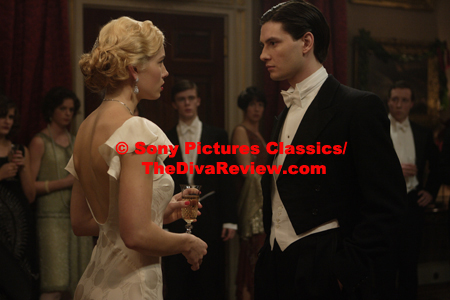 LMD:
Did you enjoy belting out the songs on the soundtrack?
LMD:
Did you enjoy belting out the songs on the soundtrack?
BB: Well, I started off doing musical theatre. When I was about fourteen, I did about six years with a company called the National Youth Musical Theatre, which was the one that Jude Law and Jamie Bell and Jonny Lee Miller had graduated from. So yes, is the short answer, as long as integral to the story and … I sound like I’m talking about nudity {in lisping voice} “As long as it’s done tastefully.” That’s how I feel though. Singing is a great storytelling device and that’s all acting is.
Of course, I thought I was Sinatra. I used to do Sinatra tribute concerts at school with a jazz orchestra. And I thought I was being really cool, and Steph wanted me to play a wally. He wanted to make him more naďve, more enthusiastic, more puppy. {In Australian accent} “More Puppy!” to me, and “More Disney witch!” to Kristen {Scott-Thomas}
{Stephan Elliott creeps through room behind Ben}
Bastard! You bastard! Why are you telling her I’m a drunk?
I forgot what we were talking about. See, this is what we’re doing. This morning, Jessica {Biel} was like, “Oh, I’m getting a bit sweaty here,” so I ran in the middle of her interview and gave her a deodorant. Just when they were asking her if it was true that I gave her flowers the first time I met her.
So, I thought of Sinatra and he wanted me to sing more like Noël Coward. So, I was in the studio, singing, {jazzy} “Room with a view, da-da-daa,” thinking I’m cool, and then Stephan’s like, {in posh 1930’s accent} “Rrrrrrooommm with a viieewwwww…” so it ended up somewhere in between.
 LMD:
Stephan also said that your being smitten with Jessica did about
three-quarters of the work for him.
LMD:
Stephan also said that your being smitten with Jessica did about
three-quarters of the work for him.
BB: Three quarters of the work? I’d say half. I was doing a little bit of acting.
LMD: Do you have an attraction to period films or films that take place out of modern times?
BB: Well, it’s not particularly intentional. It’s always about the script and the character first, even before the director or who else is in it. And these stories have stood the test of time and that’s why they’ve lasted, because they are great stories, and that’s good enough for me, really. They have interesting structures and interesting characters and interesting themes and fewer modern stories have that. Not that you can’t find it anywhere, but fewer.
LMD: What’s next for you?
BB: Well, I have the next Narnia film in July in Australia. Dorian Gray is coming out in England in September - I don’t know when it’s coming out here - again, another period movie, but again, another character that no actor in his right mind would pass up. It’s such a great challenge; this dark, brooding fifty-year old man who looks 21, it’s fantastic.
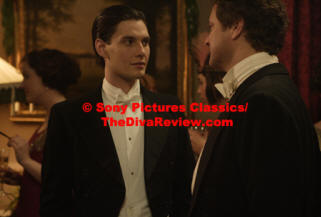 LMD:
You’re playing opposite Colin Firth again in Dorian Gray. Is it part of
your contract that every film you appear in must co-star Colin Firth?
LMD:
You’re playing opposite Colin Firth again in Dorian Gray. Is it part of
your contract that every film you appear in must co-star Colin Firth?
BB: It’s part of his contract.
LMD: Did it make Dorian Gray a bit easier for you?
BB: Well, he’s supposed to be this kind of mentoring/friend figure, and whilst Colin in real life is a useless mentor, in the film, he’s excellent.
Well, he just hangs up! You ring him with a problem, like, “Oh I’m feeling uncomfortable about this.” “I don’t know about this.” “Should I do this film?” He just texts back, “No.” One-word answers to everything.
 LMD:
Has playing in Easy Virtue given you a new appreciation of Noël Coward?
What do you think this film based on a play written in 1924 says to
audiences today?
LMD:
Has playing in Easy Virtue given you a new appreciation of Noël Coward?
What do you think this film based on a play written in 1924 says to
audiences today?
BB: Well, there’s proof in Blithe Spirit running on Broadway, it’s just a great play. It’s probably my favourite Noël Coward play, and it’s just witty and funny and uses wonderful theatrical devices and it’s got interesting points to make about mortality and love and where you stand in the universe. Easy Virtue has felt more relevant the more time passes. The fact that we’re in this recession and this family’s having to sell off their property in order to stay afloat and save face, basically. It’s got some interesting points to make about love, as well; whether love on its own is enough and the reasons you are in love. He loves her because she’s exotic and different and she loves him because she understands him completely and he’s kind of innocent, but are those good enough reasons to stay with somebody? The film would suggest not. So, I think it’s got an interesting subtext. The film even has a euthanasia subtext, as well, near the end with her first husband.
LMD: For a second, I thought you meant the Chihuahua.
BB: No, that’s just cos Stephan just wanted to kill a Chihuahua in a film. He told me, “I always wanted to do it and I’m putting him in this one.”
Jessica Biel
 The
Lady Miz Diva: Can you talk about how you created Larita? I understand
in the original play she’s very hard and a bit nasty…
The
Lady Miz Diva: Can you talk about how you created Larita? I understand
in the original play she’s very hard and a bit nasty…
Jessica Biel: Yeah she’s cold.
LMD: How did you strike a balance to make her sympathetic and what research did you do to get her right?
JB: Yeah, I looked at a bunch of older films. Lots of Katherine Hepburn stuff; The Philadelphia Story, Bringing Up Baby. Physicality – watching her physicality and her delivery, which is just kill ’em with a smile, and amazing dry, witty dialog. She’s the best for that. I looked at a little Jean Harlow stuff, with just kind of having that sex appeal, that glamour, that kind of Diva element going on with her there. I also looked at The Palm Beach Story, lots of films like that. The idea was just to have that kind of Katherine-esque façade and really just be a real person. When it gets tough, she gets vulnerable. She’s being bullied; people are bullying her and being mean and they’re being really cruel. The idea was just to make her a real woman. How would you go through that situation? You would definitely put on a façade and try to be as tough as possible and give it back as much as possible, but privately, you’d be breaking down.
The key is you have to be on her side. The movie went through a couple of different processes from the editing of, ‘whose side are you on?’ The first couple of screenings, the audience couldn’t decide. They really liked Mrs. Whittaker and they really liked me. Steph said he just had to cut everything human about Mrs. Whit. Poor Kristen, because they had to snip it away, so she was just ruthless till the bitter end, so you just were with Larita the whole way.
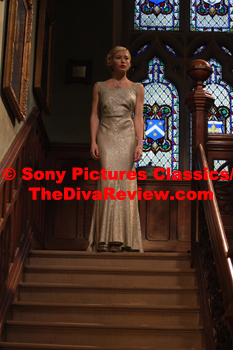 LMD:
What do you think modern audiences will take away from Easy Virtue?
LMD:
What do you think modern audiences will take away from Easy Virtue?
JB: I think that even though it was written so long ago, this story has kind of been told over and over with Meet the Parents, Meet the Fockers, you know? It’s something that people have gone through for hundreds of thousands of years, and we’re gonna still go through for the next hundreds of thousands of years, when you meet your significant other’s family, and how do you deal with it? I think we all know that a mother and son’s relationship is very special, right? {Laughs} It’s a bond and you have to be careful when you try to come in there.
But what can they take away from it? I hope that people look at Larita, specifically, and know that to not change who they are for anybody else is having integrity. If you can tale that away and be really proud of who you are in any situation, even when people are bullying you and doing whatever, then that’s something to be spoken for. Yeah, that’s strong.
~ The Lady Miz Diva
May 11th, 2009
© 2006-2022 The Diva Review.com




































